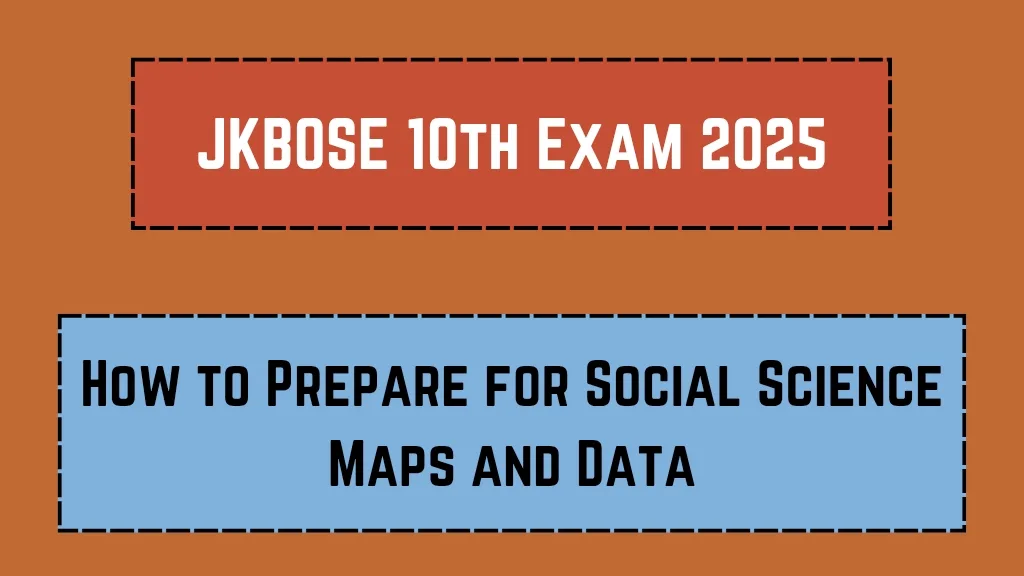The Jammu and Kashmir Board of School Education (JKBOSE) 10th exams are a crucial milestone for students. Among the subjects, Social Science often requires special attention, especially the maps and data interpretation sections. These topics not only carry significant marks but also test your analytical and geographical skills. With the right preparation strategy, you can ace this section effortlessly. This article will guide you through effective tips, resources, and techniques to master maps and data for the JKBOSE 10th Social Science exam in 2025. Let’s dive in! 🚀
Key Highlights 🌟
| Key Point | Details |
|---|---|
| Organization Name | Jammu and Kashmir Board of School Education (JKBOSE) |
| Exam Name | JKBOSE 10th Board Exam 2025 |
| Subject | Social Science |
| Important Topics | Maps, Data Interpretation, History, Geography, Civics, Economics |
| Marks Distribution | Maps (10-15 marks), Data Interpretation (5-10 marks) |
| Preparation Tips | Practice maps daily, analyze data, use NCERT books, solve previous papers |
| Best Resources | NCERT textbooks, JKBOSE sample papers, online map quizzes |
| Exam Date | To be announced (usually March-April) |
| Official Website | jkbose.nic.in |
Understanding the Syllabus 📖
Before diving into preparation, it’s essential to understand the Social Science syllabus for JKBOSE 10th exams. The syllabus is divided into four main sections:
- History – Focuses on events, dates, and historical significance.
- Geography – Covers physical and political maps, climate, and resources.
- Civics – Deals with governance, democracy, and rights.
- Economics – Includes data interpretation, economic development, and sectors.
The maps and data interpretation section primarily falls under Geography and Economics. Knowing the syllabus helps you prioritize topics and allocate time effectively.
Importance of Maps and Data in Social Science 🗺️📊
Maps and data interpretation are not just about scoring marks; they help you develop a deeper understanding of the world. Here’s why they matter:
- Maps: They enhance your geographical knowledge and spatial awareness.
- Data Interpretation: It improves analytical skills and helps you understand economic trends.
These sections are scoring if practiced regularly. A well-labeled map or a correctly interpreted graph can fetch you full marks.
Step-by-Step Guide to Prepare for Maps 🗺️
1. Identify Important Map Topics
Focus on frequently asked map topics like:
- Physical features (rivers, mountains, plateaus)
- Political boundaries (states, countries)
- Resource distribution (minerals, crops)
2. Practice Daily
Dedicate 15-20 minutes daily to map practice. Use blank maps and label them accurately.
3. Use Color Coding
Color-coding different regions or features can help you remember them better.
4. Refer to NCERT Maps
NCERT textbooks have detailed maps. Practice them thoroughly.
5. Take Online Quizzes
Websites like Seterra offer interactive map quizzes for practice.
Mastering Data Interpretation 📊
1. Understand the Basics
Learn to read tables, graphs, and charts. Focus on:
- Pie charts (for percentages)
- Bar graphs (for comparisons)
- Line graphs (for trends)
2. Practice with Sample Papers
Solve previous years’ question papers to get familiar with the type of data questions asked.
3. Analyze Real-World Data
Look at economic surveys or census data to improve your interpretation skills.
4. Focus on Accuracy
Ensure your calculations and interpretations are precise to avoid losing marks.
Best Resources for Preparation 📚
Here are some highly recommended resources:
| Resource Type | Details |
|---|---|
| NCERT Textbooks | The primary source for syllabus content. |
| JKBOSE Sample Papers | Available on the official website for practice. |
| Online Map Quizzes | Websites like Seterra and Quizlet for interactive learning. |
| Reference Books | Books like ‘Together with Social Science’ for additional practice. |
| YouTube Channels | Channels like ‘Exam Fear’ for video tutorials. |
Time Management Tips ⏰
Balancing map practice, data interpretation, and other subjects can be challenging. Here’s how to manage your time effectively:
- Create a Study Schedule
Allocate specific time slots for maps and data daily. - Set Weekly Goals
Aim to complete a certain number of maps or data sets each week. - Revise Regularly
Weekly revision helps retain information better. - Use a Timer
Practice maps and data within a set time limit to simulate exam conditions.
Common Mistakes to Avoid ❌
Even the brightest students make mistakes. Here’s what to watch out for:
- Incomplete Map Labeling: Always label all required features.
- Misinterpreted Data: Double-check your calculations and conclusions.
- Ignoring NCERT: Stick to NCERT textbooks as they cover the entire syllabus.
- Last-Minute Cramming: Start early and practice consistently.
Kriti Reddy is a freelance writer specializing in exam results and admit cards. With a background in Psychology and 4+ years of experience, Kriti enjoys creating informative content for students. She loves reading novels.



![JKBOSE 12th Passing Marks 2025: Theory & Practical [All Subjects] JKBOSE 12th Passing Marks 2025_20250430_093631_0000](https://mbexams.in/wp-content/uploads/2025/04/JKBOSE-12th-Passing-Marks-2025_20250430_093631_0000-150x150.webp)



